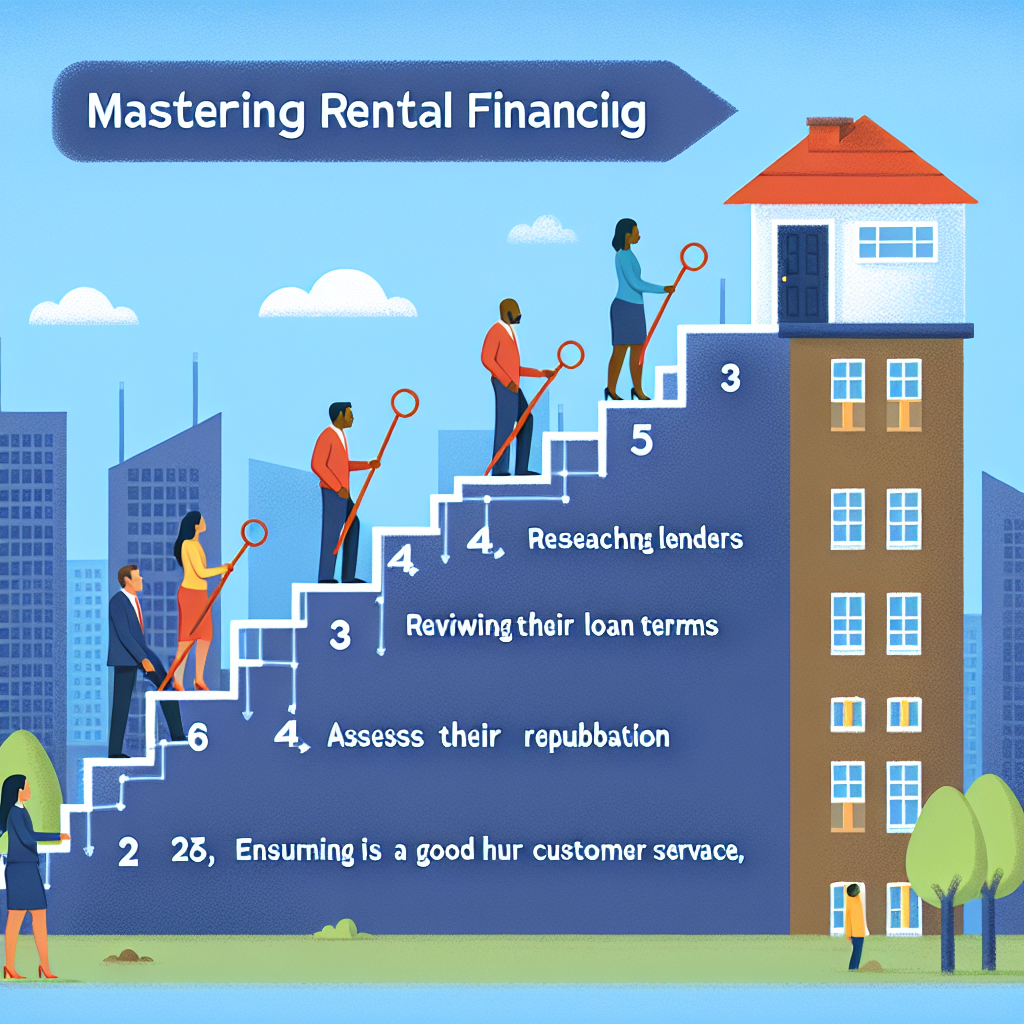-
Table of Contents
- Mastering Rental Financing: Tips for Choosing the Perfect Lender
- Understanding Rental Financing
- Types of Rental Financing
- Key Factors to Consider When Choosing a Lender
- 1. Interest Rates and Terms
- 2. Loan-to-Value (LTV) Ratio
- 3. Fees and Closing Costs
- 4. Lender Reputation and Customer Service
- 5. Flexibility and Loan Options
- Case Studies: Successful Rental Financing
- Case Study 1: Single-Family Rental Property
- Case Study 2: Multi-Family Rental Property
- Statistics: The Impact of Choosing the Right Lender
- Tips for Evaluating Lenders
- 1. Get Pre-Approved
- 2. Compare Loan Offers
- 3. Check Lender Reviews
- 4. Ask for Referrals
- 5. Evaluate Customer Service
- Conclusion
Mastering Rental Financing: Tips for Choosing the Perfect Lender

Investing in rental properties can be a lucrative venture, but securing the right financing is crucial to your success. Choosing the perfect lender can make a significant difference in your investment’s profitability and long-term viability. This article will guide you through the essential tips for selecting the ideal lender for your rental financing needs, supported by examples, case studies, and statistics.
Understanding Rental Financing
Before diving into the tips for choosing a lender, it’s important to understand what rental financing entails. Rental financing refers to the loans and financial products designed specifically for purchasing or refinancing rental properties. These loans can be used for single-family homes, multi-family units, or commercial properties.
Types of Rental Financing
- Conventional Loans: These are traditional mortgage loans offered by banks and credit unions. They typically require a higher credit score and a larger down payment.
- FHA Loans: Insured by the Federal Housing Administration, these loans are designed for borrowers with lower credit scores and smaller down payments.
- VA Loans: Available to veterans and active-duty military personnel, these loans offer favorable terms and often require no down payment.
- Portfolio Loans: These are loans held by the lender rather than being sold on the secondary market. They offer more flexibility in terms of credit requirements and property types.
- Commercial Loans: Designed for larger multi-family or commercial properties, these loans have different underwriting criteria and terms compared to residential loans.
Key Factors to Consider When Choosing a Lender
When selecting a lender for your rental financing needs, several factors should be taken into account to ensure you make the best choice. Here are the key considerations:
1. Interest Rates and Terms
The interest rate and loan terms will significantly impact your monthly payments and overall cost of the loan. It’s essential to compare rates from multiple lenders to find the most competitive offer. Additionally, consider the loan term (e.g., 15-year vs. 30-year) and how it aligns with your investment strategy.
2. Loan-to-Value (LTV) Ratio
The LTV ratio is the percentage of the property’s value that the lender is willing to finance. A lower LTV ratio means you’ll need a larger down payment, but it can also result in better loan terms. Different lenders have varying LTV requirements, so it’s important to find one that matches your financial situation.
3. Fees and Closing Costs
Lenders charge various fees, including origination fees, appraisal fees, and closing costs. These can add up quickly and affect your overall investment return. Be sure to ask for a detailed breakdown of all fees and compare them across lenders.
4. Lender Reputation and Customer Service
A lender’s reputation and customer service can make a significant difference in your borrowing experience. Look for reviews and testimonials from other investors to gauge the lender’s reliability and responsiveness. A lender with a strong track record and excellent customer service can provide valuable support throughout the loan process.
5. Flexibility and Loan Options
Different lenders offer various loan products and terms. Some may have more flexible underwriting criteria, while others may specialize in certain types of properties or borrowers. It’s important to find a lender that offers loan options tailored to your specific needs and investment goals.
Case Studies: Successful Rental Financing
To illustrate the importance of choosing the right lender, let’s look at two case studies of successful rental financing:
Case Study 1: Single-Family Rental Property
John, an experienced real estate investor, wanted to purchase a single-family rental property in a growing suburban area. He compared offers from three different lenders:
- Lender A: Offered a 30-year fixed-rate mortgage with a 4.5% interest rate and a 20% down payment requirement.
- Lender B: Offered a 15-year fixed-rate mortgage with a 4.0% interest rate and a 25% down payment requirement.
- Lender C: Offered a portfolio loan with a 30-year term, a 4.75% interest rate, and a 15% down payment requirement.
After evaluating the options, John chose Lender A due to the lower down payment requirement and competitive interest rate. This allowed him to preserve more of his capital for future investments while still securing favorable loan terms.
Case Study 2: Multi-Family Rental Property
Susan, a new investor, was interested in purchasing a small multi-family property. She received offers from two lenders:
- Lender X: Offered a commercial loan with a 5.0% interest rate, a 20-year term, and a 25% down payment requirement.
- Lender Y: Offered an FHA loan with a 4.25% interest rate, a 30-year term, and a 10% down payment requirement.
Susan chose Lender Y because the FHA loan’s lower down payment requirement allowed her to enter the market with less upfront capital. Additionally, the longer loan term provided her with more manageable monthly payments, making it easier to achieve positive cash flow from the property.
Statistics: The Impact of Choosing the Right Lender
Choosing the right lender can have a significant impact on your rental property’s financial performance. Here are some statistics that highlight the importance of making an informed decision:
- A study by the Urban Institute found that borrowers who shop around for mortgage rates can save an average of $1,500 over the life of the loan.
- According to Freddie Mac, borrowers who obtain multiple quotes can save an average of $3,000 over the life of a 30-year fixed-rate mortgage.
- The National Association of Realtors reports that the average closing costs for a single-family home are approximately $5,749, emphasizing the importance of comparing fees across lenders.
Tips for Evaluating Lenders
To help you choose the perfect lender for your rental financing needs, consider the following tips:
1. Get Pre-Approved
Obtaining pre-approval from multiple lenders can give you a better understanding of your borrowing capacity and the loan terms you can expect. This can also help you identify any potential issues with your credit or financial situation that need to be addressed before applying for a loan.
2. Compare Loan Offers
Request loan estimates from multiple lenders and compare the interest rates, terms, fees, and closing costs. Use online tools and calculators to evaluate the total cost of each loan over its term.
3. Check Lender Reviews
Research online reviews and testimonials from other investors to gauge the lender’s reputation and customer service. Look for patterns in the feedback, such as consistent praise or complaints about specific aspects of the lender’s service.
4. Ask for Referrals
Reach out to other real estate investors in your network for recommendations on lenders they have worked with. Personal referrals can provide valuable insights and help you find a lender with a proven track record.
5. Evaluate Customer Service
Contact potential lenders and assess their responsiveness and willingness to answer your questions. A lender with excellent customer service can provide valuable support throughout the loan process and help you navigate any challenges that arise.
Conclusion
Mastering rental financing is essential for any real estate investor looking to build a successful portfolio. By understanding the different types of rental financing, considering key factors when choosing a lender, and evaluating lenders based on their interest rates, terms, fees, reputation, and customer service, you can make an informed decision that aligns with your investment goals.
Remember to obtain pre-approval, compare loan offers, check reviews, ask for referrals, and evaluate customer service to find the perfect lender for your rental financing needs. By following these tips and learning from successful case studies, you’ll be well-equipped to secure the best financing for your rental properties and achieve long-term success in the real estate market.








